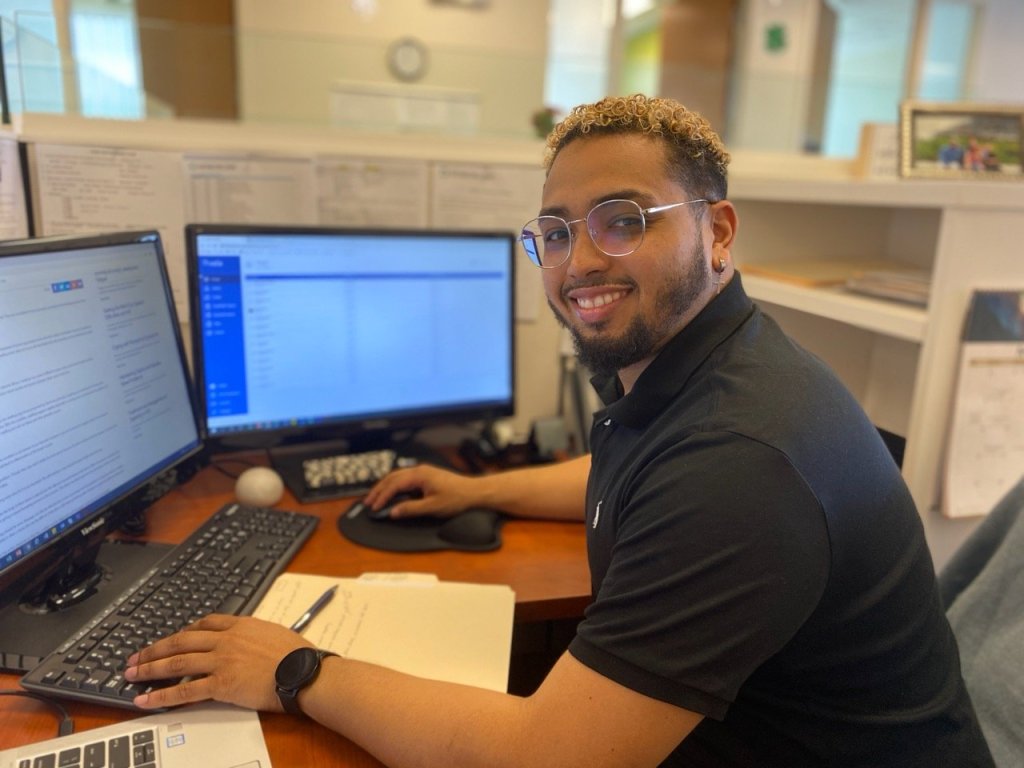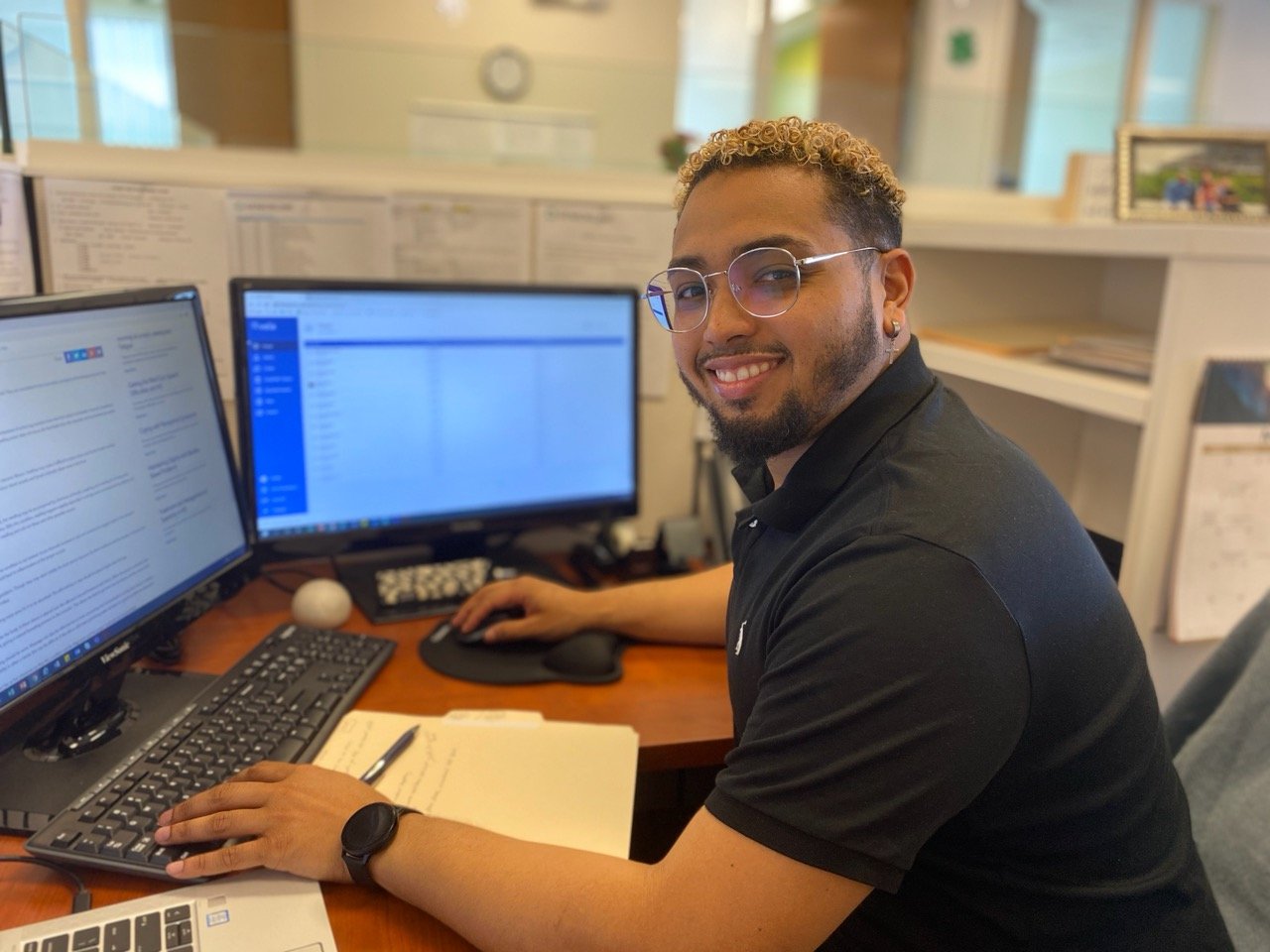
What It’s Like to Be a Remote Care Coach at Seniorlink
Darren Hairston uses technology to connect with and support 4 times the amount of families he did as a social worker.
 I get to my desk a little before 11 on a Monday morning to accommodate the different time zones for the states Seniorlink serves. The beginning of the week means I will need to respond to several caregiver inquiries that came in over the weekend. I open my laptop, open Vela, Seniorlink’s HIPAA-secure care collaboration software, which lets me interact with all of the caregivers I’m in touch with day to day and fire up a browser.
I’m a remote care coach for Seniorlink. I have a big caseload, but my job, with the support from my team and the software we use, make my caseload manageable. In fact, I can be helpful to 4 times the amount of people in this job compared to the routine social work I had done before working for Seniorlink.
In some ways, remote coaching has helped me develop relationships with families faster.
I am one of a group of nine care coaches, most of which work out of the company’s Operational Support Services Unit in Quincy, Massachusetts. In my role, I communicate with caregivers across the company’s several states – including Massachusetts, Ohio, Indiana, Rhode Island, South Dakota, and Georgia – via text message through the Vela app. I am part of a brand-new model within social services, particularly in how we address the needs of caregivers. This is the story of how I got here, and what it’s like to work as a remote care coach.
I get to my desk a little before 11 on a Monday morning to accommodate the different time zones for the states Seniorlink serves. The beginning of the week means I will need to respond to several caregiver inquiries that came in over the weekend. I open my laptop, open Vela, Seniorlink’s HIPAA-secure care collaboration software, which lets me interact with all of the caregivers I’m in touch with day to day and fire up a browser.
I’m a remote care coach for Seniorlink. I have a big caseload, but my job, with the support from my team and the software we use, make my caseload manageable. In fact, I can be helpful to 4 times the amount of people in this job compared to the routine social work I had done before working for Seniorlink.
In some ways, remote coaching has helped me develop relationships with families faster.
I am one of a group of nine care coaches, most of which work out of the company’s Operational Support Services Unit in Quincy, Massachusetts. In my role, I communicate with caregivers across the company’s several states – including Massachusetts, Ohio, Indiana, Rhode Island, South Dakota, and Georgia – via text message through the Vela app. I am part of a brand-new model within social services, particularly in how we address the needs of caregivers. This is the story of how I got here, and what it’s like to work as a remote care coach.
 I get to my desk a little before 11 on a Monday morning to accommodate the different time zones for the states Seniorlink serves. The beginning of the week means I will need to respond to several caregiver inquiries that came in over the weekend. I open my laptop, open Vela, Seniorlink’s HIPAA-secure care collaboration software, which lets me interact with all of the caregivers I’m in touch with day to day and fire up a browser.
I’m a remote care coach for Seniorlink. I have a big caseload, but my job, with the support from my team and the software we use, make my caseload manageable. In fact, I can be helpful to 4 times the amount of people in this job compared to the routine social work I had done before working for Seniorlink.
In some ways, remote coaching has helped me develop relationships with families faster.
I am one of a group of nine care coaches, most of which work out of the company’s Operational Support Services Unit in Quincy, Massachusetts. In my role, I communicate with caregivers across the company’s several states – including Massachusetts, Ohio, Indiana, Rhode Island, South Dakota, and Georgia – via text message through the Vela app. I am part of a brand-new model within social services, particularly in how we address the needs of caregivers. This is the story of how I got here, and what it’s like to work as a remote care coach.
I get to my desk a little before 11 on a Monday morning to accommodate the different time zones for the states Seniorlink serves. The beginning of the week means I will need to respond to several caregiver inquiries that came in over the weekend. I open my laptop, open Vela, Seniorlink’s HIPAA-secure care collaboration software, which lets me interact with all of the caregivers I’m in touch with day to day and fire up a browser.
I’m a remote care coach for Seniorlink. I have a big caseload, but my job, with the support from my team and the software we use, make my caseload manageable. In fact, I can be helpful to 4 times the amount of people in this job compared to the routine social work I had done before working for Seniorlink.
In some ways, remote coaching has helped me develop relationships with families faster.
I am one of a group of nine care coaches, most of which work out of the company’s Operational Support Services Unit in Quincy, Massachusetts. In my role, I communicate with caregivers across the company’s several states – including Massachusetts, Ohio, Indiana, Rhode Island, South Dakota, and Georgia – via text message through the Vela app. I am part of a brand-new model within social services, particularly in how we address the needs of caregivers. This is the story of how I got here, and what it’s like to work as a remote care coach.


